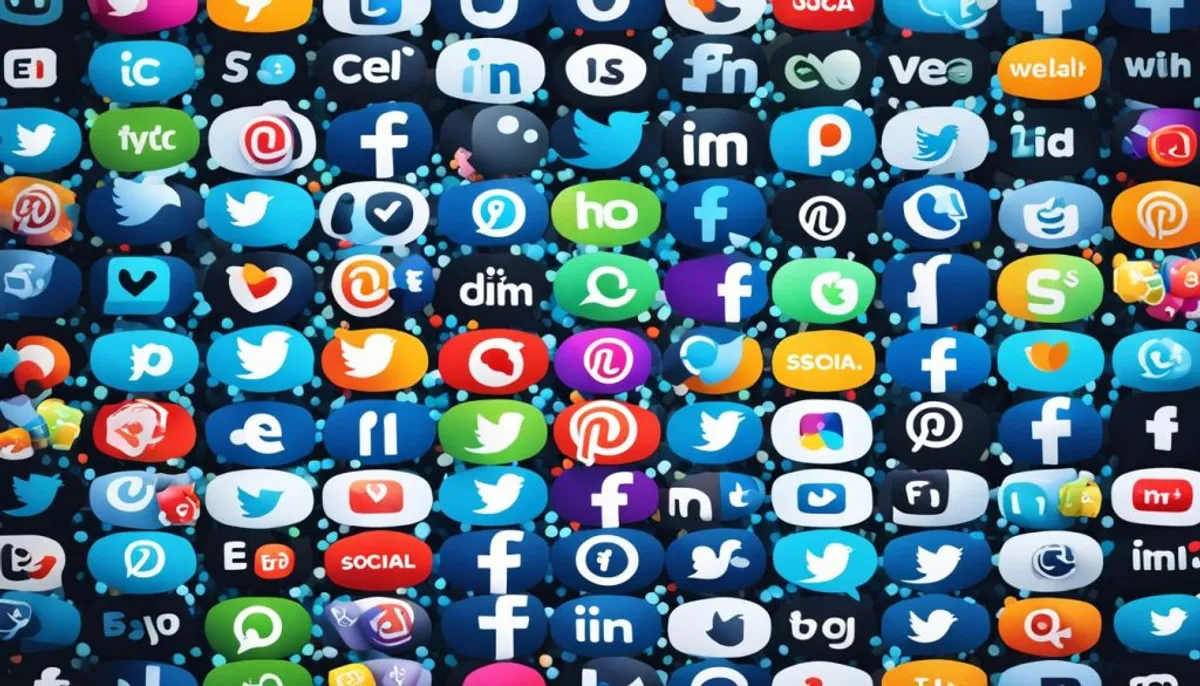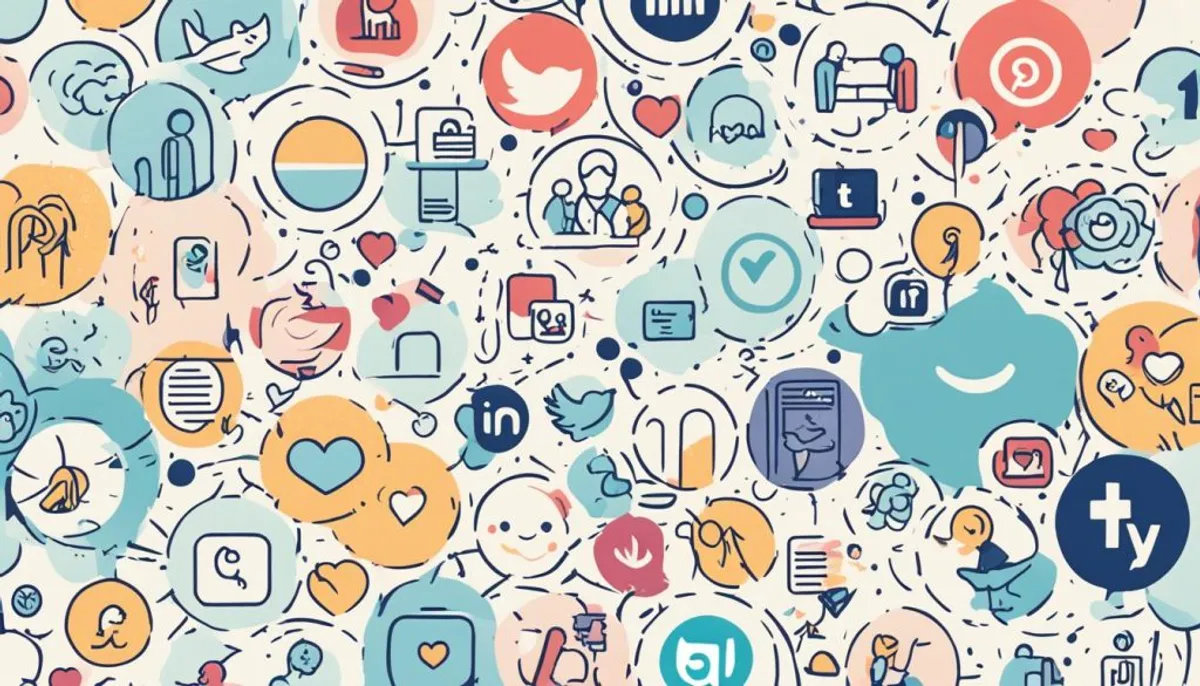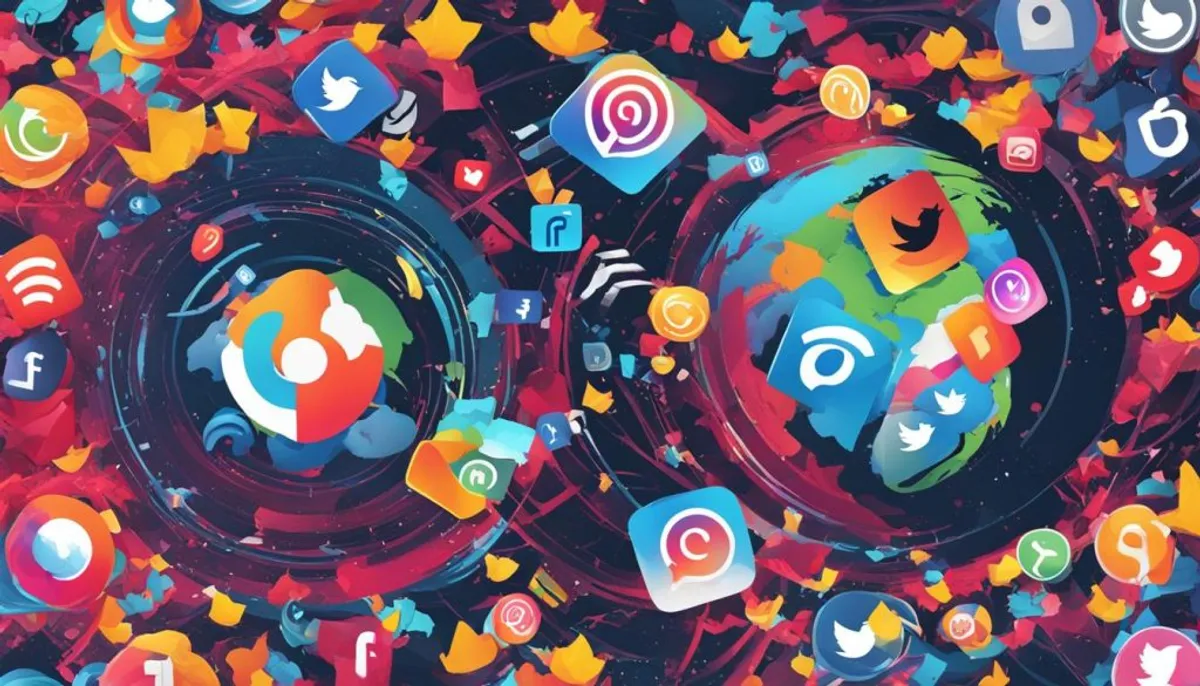Social media has become a big part of our lives, changing how we talk, network, and see the world. The debate about its good and bad sides is getting more intense. This article will look at social media’s history, its benefits and downsides, and how to use it wisely.
Social media has changed how we connect, share info, and interact online. It started with big platforms like Facebook, Twitter, and Instagram. Now, it’s a key part of our online lives, shaping our communication, networking, and communities online. Understanding its impact on us is crucial.

The good and bad sides of social media are many. It helps us make connections and find information, but it also raises concerns about privacy, protecting user privacy, cyberbullying, and false info. Knowing these pros and cons helps us use social media better and make smart choices.
This article aims to be a guide through the social media world. It will give a history, look at the main benefits and challenges, and offer tips for using social media wisely. By grasping the internet influence and how these platforms work, we can better navigate the social media debate and make informed choices about our online lives. Additionally, businesses can use these platforms to engage with potential customers effectively.
The Rise of Social Media
The history of social media is a journey that has changed how we talk and connect online. Today, social media is a big part of our lives, offering numerous social media benefits. Billions of people use these tools to share, connect, and stay updated.
Historical Overview of Social Media Platforms
Social media started in the late 1990s with SixDegrees.com. It let users make profiles and connect with friends. Since then, many social media platforms have come up, each with its own features.
Platforms like Friendster and MySpace came in the early 2000s. Then, Facebook, Twitter, Instagram, and LinkedIn took over, enhancing connectivity and communication. This shows how social media has changed to meet our needs.
Now, about 72.5% of Americans and 63.82% of people worldwide use social media. This shows how big and important these platforms are in our lives. They’ve changed how we get info, interact with businesses, and build communities.
| Social Media Platform | Launch Year | Key Features |
|---|---|---|
| SixDegrees.com | 1997 | One of the first social media platforms, allowing users to create profiles and connect with friends. |
| Friendster | 2002 | An early social networking platform that focused on building online communities. |
| MySpace | 2003 | A popular social networking site that allowed users to customize their profiles and share content. |
| 2004 | The largest and most influential social media platform, offering a wide range of features for connecting, sharing, and engaging with others. | |
| 2006 | A microblogging platform that enables users to share short updates and interact with a global network. | |
| 2010 | A visually-driven social media platform focused on sharing photos and videos with followers. | |
| 2003 | A professional networking platform that allows users to connect with colleagues, share career updates, and search for job opportunities. |
Social media has changed how we talk, get info, and connect with others and businesses. It’s a big part of the digital revolution.
Advantages of Social Media
Social media has become a key part of our lives, offering many benefits, including online self-expression. It helps people and businesses connect, share information, and market products. These platforms are powerful tools that touch many areas of our lives.
One big plus of social media is keeping up with loved ones no matter where they are. It lets people share life moments and stay close. It’s also a great way to learn new things and get updates on topics you’re interested in.
For businesses, social media has changed the game in marketing. It’s a cost-effective way to reach customers and build brand awareness. Companies can share their products and talk directly with their audience. This has helped businesses of all sizes grow and thrive.
Social media has also made it easier for people to get involved in community issues. It helps with fundraising, spreading awareness, and giving a voice to those who need it. Additionally, businesses can use social media to engage with potential customers, which has a big impact on communities around the world.
Lastly, social media has opened up new work opportunities that let people work from anywhere. This is especially useful during tough times, like the COVID-19 pandemic. It has changed how we work and connect with each other.
In summary, social media offers many benefits. It connects us, gives us information, helps with marketing, supports community efforts, and offers flexible work options. As technology keeps advancing, social media’s role in our lives will only grow more significant.

| Advantage | Description |
|---|---|
| Social Connectivity | Enables users to stay connected with family and friends globally |
| Access to Information | Provides access to a wealth of information and educational resources |
| Digital Marketing | Offers cost-effective and targeted ways for businesses to reach and engage with potential customers |
| Civic Engagement | Facilitates participation in fundraising, social awareness campaigns, and giving marginalized groups a voice |
| Remote Work Opportunities | Enables individuals to connect, collaborate, and contribute to projects from anywhere |
Disadvantages of Social Media
Social media has many benefits, like keeping us connected and giving us lots of information. But, it also has downsides that we can’t ignore. Issues like social media addiction, cyberbullying, mental health issues, and online privacy concerns are real and need attention.
Addressing the Challenges of Social Media Usage
Digital addiction is a big worry with social media regulation. The endless likes and shares can make us crave more, leading to bad habits and missing out on real life. This can hurt our work, relationships, and happiness.
Cyberbullying is another big problem. Social media can be a place for bullies to spread hate and lies. This can lead to mental health issues and even real-life trouble.
Also, social media uses a lot of our personal info, which worries many people. Protecting user privacy is essential, as sharing too much can lead to social isolation and a loss of trust in online places.
| Challenge | Impact |
|---|---|
| Social Media Addiction | Decreased productivity, damaged relationships, and overall well-being |
| Cyberbullying | Mental health issues, real-world conflicts, and the spread of misinformation |
| Online Privacy Concerns | Potential misuse of personal data, leading to social isolation and lack of trust |
We need to tackle the challenges of social media head-on. By understanding the risks and acting to reduce them, we can use social media wisely. This way, we can enjoy its benefits without the downsides.
The social media pros and cons debate
The debate about social media’s impact is complex. Some see it as a way to connect people worldwide through online communication and digital networking. Others worry about cyberbullying, mental health, and misinformation.
Social media has changed how we connect with others. It has made virtual communities and internet influence possible across the globe. It’s now key for businesses and people, offering new ways to market and share info.
But, there are concerns about online privacy and how addictive these platforms can be. Feeling the need to always share our lives online can make us feel bad and lead to social comparison. This can hurt our mental health.
As social media grows more important in our lives, understanding its impact is crucial. The debate shows we need to find a balance between connectivity and communication. This ensures social media is used responsibly and benefits everyone.
| Pros of Social Media | Cons of Social Media |
|---|---|
| Facilitates global connectivity and communication | Potential for digital addiction and mental health issues |
| Provides new avenues for digital marketing and business opportunities | Concerns about online privacy and the spread of misinformation |
| Allows for the creation of virtual communities and internet influence | Risks of cyberbullying and negative social comparisons |

Navigating Social Media Responsibly
Social media’s impact is growing fast. It’s key to use it wisely. By using social media well, people can enjoy its perks without harming their digital well-being.
Best Practices for Healthy Social Media Usage
Here are some social media best practices for a balanced life:
- Set clear boundaries and limits on screen time to avoid excessive usage.
- Be mindful of the content you consume and curate your feed to prioritize positivity and mental health.
- Protect your online privacy by being cautious about the personal information you share.
- Develop media literacy skills to critically evaluate the information you encounter online and identify potential misinformation.
- Engage in face-to-face interactions and pursue offline hobbies and activities to maintain a healthy balance between digital and physical wellbeing.
| Healthy Social Media Practices | Benefits |
|---|---|
| Limiting screen time | Reduced digital fatigue and improved focus |
| Curating positive content | Enhanced mental well-being and emotional resilience |
| Protecting online privacy | Safeguarding personal information and reducing vulnerability |
| Developing media literacy | Ability to critically evaluate online information and identify misinformation |
| Balancing digital and offline activities | Maintaining a healthy work-life integration and overall well-being |
By following these healthy social media usage tips, people can enjoy social media. They can also keep their mental health and digital well-being in check.
The Future of Social Media
The digital world is always changing, and social media is no exception. We can expect to see new and specialized social networks. These will focus on different interests and what people like.
New social media trends show that augmented and virtual reality will become big. They will change how we interact and experience social media. Additionally, social media regulation and decentralized social media might give users more control over their data and online life.
As technology grows, social media regulation will get more important. Governments and groups will work harder to deal with issues like bad content, false information, and social media’s effects on mental health.
The future of social media will need everyone to work together. Users, businesses, and policymakers must find ways to handle the digital changes well. With new emerging social media platforms and tech, making sure these platforms are safe and used right will be key.
| Emerging Social Media Trends | Potential Regulatory Measures |
|---|---|
|
|
Conclusion
Social media is a big part of our lives today. It brings us together, gives us information, and helps with marketing. But, it also has downsides like digital addiction, cyberbullying, and mental health issues.
As we talk about the good and bad of social media, we need to use it wisely. We should learn how to use media well and keep up with changes online. By doing this, we can enjoy the good things about social media while avoiding the bad.
The future of social media is exciting but also a bit scary. By understanding the social media pros and cons, using it wisely, and focusing on digital well-being, we can make the most of it. This way, we can build a world that’s more connected, informed, and strong.
RelatedRelated articles



